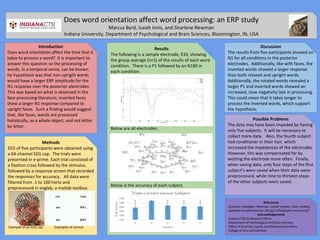Marcus Byrd Poster V8.pptx
- 1. Introduction Does word orientation affect the time that it takes to process a word? It is important to answer this question so the processing of words, in a temporal sense, can be known. he hypothesis was that non-upright words would have a larger ERP amplitude for the N1 response over the posterior electrodes. This was based on what is observed in the face processing literature; inverted faces show a larger N1 response compared to upright faces. Such a finding would suggest that, like faces, words are processed holistically, as a whole object, and not letter by letter. Methods EEG of five participants were obtained using a 64-channel EEG cap. The trials were presented in e-prime. Each trial consisted of a fixation cross followed by the stimulus, followed by a response screen that recorded the responses for accuracy. All data were filtered from .1 to 100 hertz and preprocessed in eeglab, a matlab toolbox. Example of an EEG cap Examples of stimuli References Sussman, Reddigari, Newman. (under review). Does reading spatially transformed text disrupt orthographic processing? Acknowledgements Indiana CTSI/IU Research Office Department of Psychological and Brain Sciences Office of Diversity, Equity, and Multicultural Affairs College of Arts and Sciences Possible Problems The data may have been impeded by having only five subjects. It will be necessary to collect more data. Also, the fourth subject had conditioner in their hair, which increased the impedances of the electrodes. However, this was compensated for by wetting the electrode more often. Finally, when saving data, only four steps of the first subject’s were saved when their data were preprocessed, while nine to thirteen steps of the other subjects were saved. Results The following is a sample electrode, E33, showing the group average (n=5) of the results of each word condition. There is a P1 followed by an N180 in each condition. Below are all electrodes. Below is the accuracy of each subject. Discussion The results from five participants showed an N1 for all conditions in the posterior electrodes. Additionally, like with faces, the inverted words showed a larger response than both rotated and upright words. Additionally, the rotated words revealed a larger P1 and inverted words showed an increased, slow negativity late in processing. This could mean that it takes longer to process the inverted words, which support the hypothesis. Does word orientation affect word processing: an ERP study Marcus Byrd, Isaiah Innis, and Sharlene Newman Indiana University, Department of Psychological and Brain Sciences, Bloomington, IN, USA
